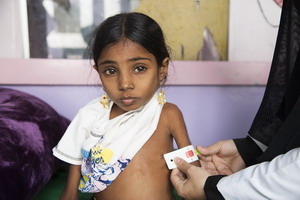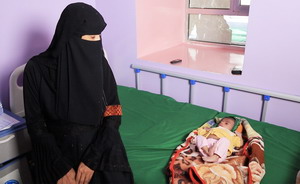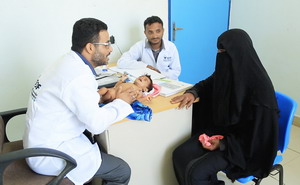 Seven-year-old Afaf travels more than 100 km of difficult roads to receive treatment for severe acute malnutrition17 December 2018 – Afaf, 7, has come to Aslam district to Al Jumhouri Hospital in Hajjah governorate, Yemen, a journey of more than a 100 km over difficult roads, to receive treatment for severe acute malnutrition and other problems.
Seven-year-old Afaf travels more than 100 km of difficult roads to receive treatment for severe acute malnutrition17 December 2018 – Afaf, 7, has come to Aslam district to Al Jumhouri Hospital in Hajjah governorate, Yemen, a journey of more than a 100 km over difficult roads, to receive treatment for severe acute malnutrition and other problems.
“When we have money to seek medical care we take her to the hospital, but when we don’t she must stay at home until she recovers on her own,” said Um Afaf.
In the same hospital is Nabila Yahya. She has come from Al Shaghadira District with her six-week old daughter Amira.
“My husband is ill,” says Nabila, “and cannot find a job. He used to work as a taxi driver but then the price of fuel doubled and he could longer afford it. Now he stays home.”
Amira has been sick since she was born.
“Something is wrong with her throat and she can’t breastfeed. She suffered from diarrhoea and we took her to the health facility many times. Each time they released her she became ill again and had to be returned for further medical care,” says Amira’s mother.
“She has been in this health facility for a week now. She was admitted as an inpatient and they are treating her well.”
Around 50% of hospitals and health facilities in Yemen are either not working or functioning partially. People in many areas have to travel long distances in order to access basic health care.
To enhance access to health care for people who would otherwise have to travel hundreds of kilometres to receive treatment WHO and health partners support the Minimum Service Package (MSP) which focuses on eight priority health care services, targeting health facilities at the district level.
 Nabila Yahya at Al Jumhouri Hospital with her six week old daughter AmiraThe MSP touches the lives of over 6.5 million Yemenis. It supports an estimated 125 health facilities and more than 2600 health care workers across the country. As MSP continues to expand, the hope is that more men, women and children will be treated.
Nabila Yahya at Al Jumhouri Hospital with her six week old daughter AmiraThe MSP touches the lives of over 6.5 million Yemenis. It supports an estimated 125 health facilities and more than 2600 health care workers across the country. As MSP continues to expand, the hope is that more men, women and children will be treated.
Economic collapse, poverty and a lack of services have left a great many people vulnerable. They must struggle to survive, often in communities that have little awareness of health and preventive practices.
Ismail Mohammed lies in his mother’s arms in an MSP supported health facility in Al Mahabisha District of Hajjah Governorate. He bled heavily following his circumcision and is severely malnourished.
“Every time he used to breastfeed he would get diarrhoea. So we brought him to this health facility where he was tested. They said he had infections and provided him with therapeutic milk,” says Ismail’s mother.
Access to health care for all
Six-month old Yousra was brought to the MSP supported Al Shaheed Hospital in Khairan Al Muharaq. Severely malnourished and excruciatingly frail – she weighs just 3 kilograms – she cries constantly. Her father sits on the hospital floor with his second child next to him while his wife speaks to the doctor. They both seem disoriented and unsure what is wrong with their child.
“She has had a fever for over three weeks. Yousra’s father is unemployed and we have nothing and no one to support us,” says Yousra’s mother.
 Six month old Yousra weighs 3 kg. She arrived at Al Shaheed hospital severely malnourishedAl Shaheed hospital’s Dr Ali Al Ashwal says severe acute malnutrition with medical complications, as well as communicable diseases, are spreading in communities.
Six month old Yousra weighs 3 kg. She arrived at Al Shaheed hospital severely malnourishedAl Shaheed hospital’s Dr Ali Al Ashwal says severe acute malnutrition with medical complications, as well as communicable diseases, are spreading in communities.
“Due to lack of resources and poverty families like Yousra’s are forced to use whatever means they can find to feed their children,” he says.
Yousra has been fed goat milk since birth. Dr Ali advises her parents she needs to be admitted for at least two weeks. She will be referred to Abs Health Centre where capacity for inpatients is available. It is an hour away from Al Shaheed hospital.
“We lack a therapeutic feeding centre with inpatient capacity here though we hope to be able to provide one soon.”
MSP provides essential services in health centres, covering nutrition, noncommunicable diseases and environmental health, trauma care, childcare, reproductive, maternal, newborn and child health. It aims to provide access to health care at all levels, targeting priority health needs and recalibrating an unbalanced health system.
With the generous support of our donors, including the World Bank, the Office of U.S. Foreign Disaster Assistance, Saudi Arabia, United Arab Emirates, Germany, Italy, Japan, EU Humanitarian Aid (ECHO), and Kuwait, we are working to ensure universal health coverage becomes a reality.








